The history of moving the system administrator in Germany. Part Two: Moving and First Steps
Hello.
I finally found the time and wrote the second part of my story about IT emigration. The first part can be read here - History of moving the system administrator to Germany. Part one: job search and visa . In this part, I will describe in detail how my sister and I settled in a new place, what mistakes we made and how much these mistakes cost us.
So let's go.
')
We had two international passports, a national visa, a work contract, a study contract and a whole host of things of all sorts and colors, as well as a bald cat, a long list of tasks, a car and a few thousand euros that would fall apart. It is not that all this was necessary for moving to Germany, but if you started to emigrate from Russia, it becomes difficult to stop. The only thing that worried me was housing. Nothing in the world is more helpless, irresponsible and vicious than finding an apartment in Frankfurt. I knew that sooner or later we would face this.

When I finally got a visa and it became clear that we were really going, my sister and I had only a month left. Prior to this, active actions were fraught with - a visa could not be given. In the end, we had to spin like squirrels in a wheel. We decided to go by car. I had to urgently do international veterinary documents for the cat, sort things out for “take it with you now” and “take it to my parents for now”, repair the car, go to the doctors, swear at the owners of our St. Petersburg apartment about the pledge ... on a bunch of institutions to collect documents for the German language visa. We both worked almost until the last day, because we desperately needed money — we had savings, of course, but how long it would take to move, we couldn’t even think about it. Here we were greatly helped by my hobby for amateur radio: by urgently selling off almost all the radio khams accumulated over the course of almost 9 years, we managed to gain a very good amount.
The question of housing arose before us almost immediately. Finding something in Germany remotely for a long time is unrealistic from the word “absolutely”. Especially in Frankfurt. Especially a month before arrival. And even more so with the cat. Through a site to search for tourist accommodation airbnb.com, my sister found an ideal option for these conditions - renting an apartment in the suburbs near the train station, 25 minutes by train from the city center. It cost some really terrible money, in the region of 1,300 euros per month, but we had nothing to choose from: everything else was either more expensive than two times like that, or it was located near the devil on the horns.
Having decided the main business, we laid a route through Latvia, Lithuania and Poland, calculated the road for 3 days, booked two apartments for overnight stays, quit and began to collect things.

On the last day we loaded the most necessary things into the car. Both had been on their feet for almost a day. Actually, we had a clearly planned relocation plan, and we didn’t anticipate anything: everything had to be shipped the day before, and on the last day we wanted to celebrate our departure in the pub ... But less than a week before the scheduled departure date I got seriously ill , and in the end all the plans flew to hell. And we naively planned to leave in the back seat a place for a cat where he could lie, sleep and eat, but there was so much “most necessary” things that the car was filled to the very roof (including two trunks), and we had a great skill "Shove nevpihuemoe." The cat eventually drove all the way at her sister's arms.
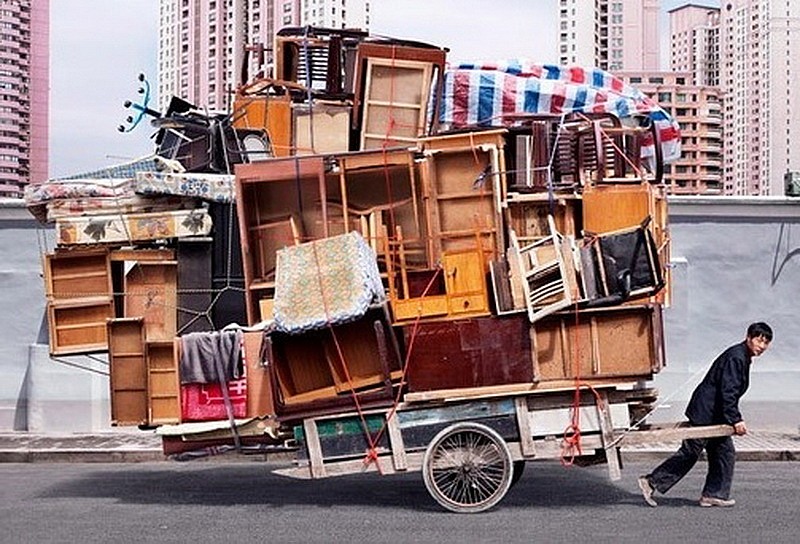
It was early morning, September 22, 2017. We last exited the entrance of the house where we lived for a year. In the parking lot, there was a car loaded at the most nowhere, in the carry we carried a cat, not yet suspecting what test it was waiting for. Our feelings were complicated: the past life was over, the new one had not yet begun, there were 2,200 kilometers ahead and three days to go.
Our road to Germany has begun.
The first day I will probably never forget. The route was seemingly simple: St. Petersburg - Kaunas. But first, we lost a lot of time at the consulate for an unsuccessful attempt to get a visa for our sister one day (which we were ready to read on the day before, but to put it on, the consulate demanded that they leave their passport for a day), and then they collected a lot of traffic jams and for three hours they stuck border because of the cat, which very slowly made out an aunt from the veterinary control. As a result, that day I, still not fully recovered and with a terrible lack of sleep, spent behind the wheel for about 15 hours, holding on to the antipyretic and energy. The cat also heroically kept, but at the twelfth hour he could not stand it and let it go, sitting on the lap of my sister ... I had to urgently search in the middle of the night for refueling in order to put my sister and car in order. Having reached the same night deep in Kaunas, we collapsed to sleep as if killed.
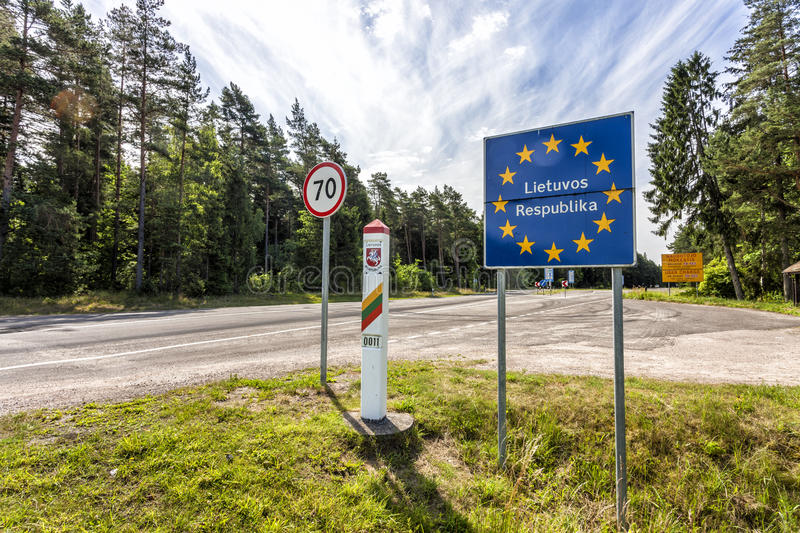
The second day was easier. Reaching the store for a local sim card (where we’re without internet), we headed for Polish Lodz. Three radio stations in the car talked about different voices, the cat sluggishly yelled, my sister and I looked around and still did not believe that we were not going on vacation. Having carefully patched near Warsaw because of the construction of the autobahn and having otvertovav threshold of the car about the cobblestone turned up inappropriately, we got to Lodz in the evening. The cat relaxed - it seemed that he thought that now he would no longer be taken anywhere ... A poor fellow.

On the third, final, day we covered about 900 kilometers - fortunately, already on the autobahn. The cat humbled and slept, hiding his head on his sister's lap. In the town of Neu-Isenburg (Neu-Isenburg), near Frankfurt, we were met by the owner of our temporary apartment, Adem. A Turk by nationality, he was fluent in German, had already lived in Germany for a long time and turned out to be a very hospitable person - he waited until late at night, he “staked out” a parking space for us and helped unload the car. Before falling asleep, I still managed to get Juniper SRX100 out of our luggage, connect an access point, a modem, and access the Network via LTE — there was no Internet connection in this apartment. Sister, too, of the last strength, posted in the social network that we arrived :)
The very first thing that you need to do not come to Germany as a tourist is to register at your place of residence. Without registration (Anmeldung) practically nothing can be done here - it is required for opening a bank account, for concluding many contracts for services and, most importantly, for obtaining a residence permit - Aufenthaltstitel. We have already learned about the fact that this Anmeldung is to be rented for a month through an airbnb housing, which is not accepted, we already learned upon arrival. The landlord at first refused us categorically, but then he nevertheless agreed to discuss this issue and granted us a visit with the whole family - apparently, for clarity. What is the joke, you ask?
Everything is quite simple. If you rent an apartment and are registered in it, you can only be evicted through court. Even if you do not pay for it and in every way violate public order. Naturally, no one of these apartment hemorrhoids is needed, but we managed to convince the owners of our trustworthiness and get their written consent for registration - on parole that we will not abuse trust. With this paper, we went to the town hall (Bürgeramt) and registered me, having received the coveted Meldbescheinigung - confirmation of registration at the place of residence. Why just me? As I already told, my sister did not have time to get a German language visa and arrived at the Schengen tourist, and tourists are not registered here.
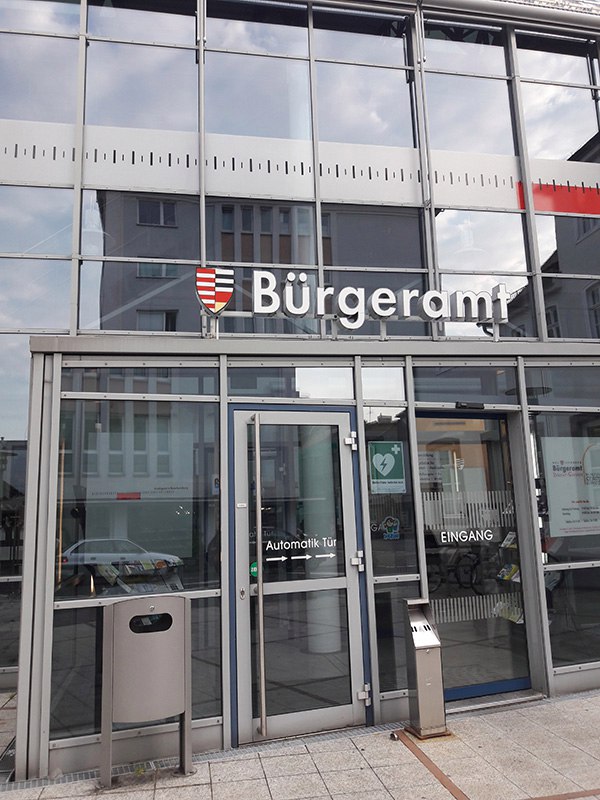
The next quest was a bank where you had to open an account - without it, living in Germany is impossible. The salary comes to this account, different payments are deducted from this account (telephone, Internet, etc.) ... Taking my sister as an interpreter, I went to the bank nearest to us - it turned out to be Sparkasse. And here we learned the magic German word Termin, which largely determines the life of the Germans :) Termin is a record in the institution, or to a doctor, or any appointment at all. Most of the actions in firms and institutions in Germany are done only with the preliminary appointment of Termin. The bank was not an exception - it was necessary to appoint Termin to open an account, and they had the nearest free time only in a week.
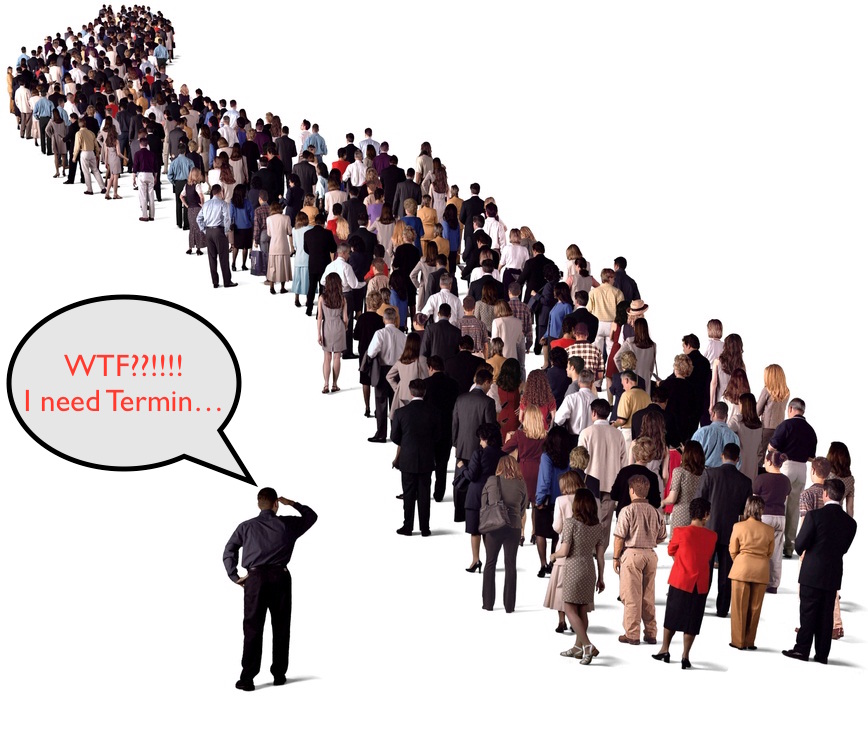
Having doubted the adequacy of the bank, I called my employer - they assured me that this was the norm in Germany and that no one would require a bank account from me on the first working day. So we appointed Termin, and after a week I opened an account in half an hour, to which, with a sigh of relief, we put our cash savings brought from Russia. Sister, again because of the "wrong" visa, the bank account is not supposed to.
Then I made the first mistake: I opened an account in the suburban branch of the bank, not making sure that I could serve it where I was going to live. Sparkasse is like the Russian Sberbank, a bunch of branches under one brand, but you can only serve the account where it was opened. As it turned out later, in Frankfurt there are no branches of the regional Sparkasse, as well as cash-in ATMs thereof. Well at least you can withdraw cash without a fee throughout Germany, yes.
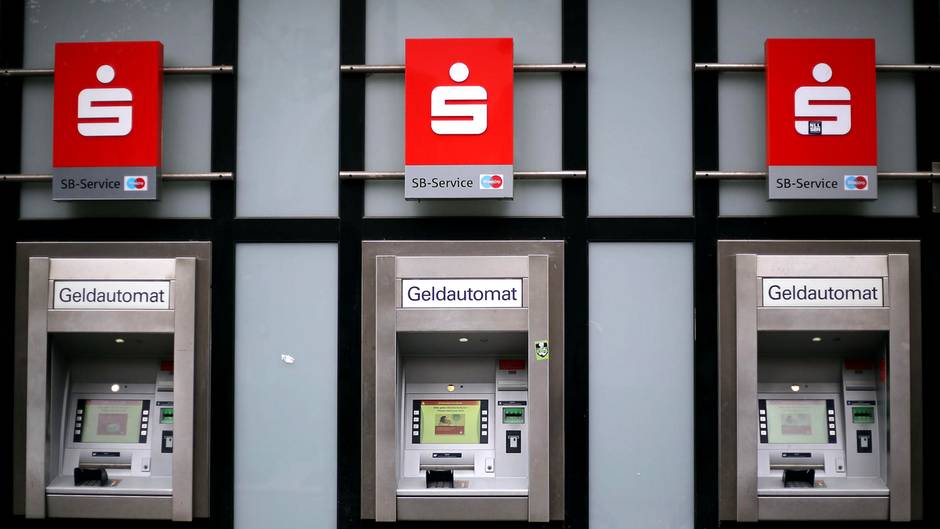
There are a lot of mobile operators in Germany, but all tariffs are more or less similar and are divided into two groups - prepaid and contract, and compared to Russia they are very expensive. The average package (unlimited calls and 5-7 GB of traffic per month) will cost 15-20 euros at a prepaid tariff. On a contract a little cheaper.
To temporarily solve the problem of home Internet, we bought a contractual tariff with conditionally unlimited traffic (10 GB LTE without speed limit, then the speed is cut to 1 Mbit) for 29 euros per month. We used this sim card for several months - until we moved to a permanent apartment and did not connect a landline Internet, after which the "unlimited" card was transferred to my sister, who always lacked 5 GB of her prepaid tariff. At the same time I was immediately given a phone with a corporate sim card.
Here there is one nuance that newbies often do not know: a contract is concluded for a fixed term (a year or two), and it is impossible to break it before. Just stop paying, too, can not - it will quickly reach the collectors and / or court, plus your credit history will be hopelessly flawed. Moreover, the contract is automatically renewed if you did not write a waiver of renewal 3 months before its expiration. The same applies in general to almost any service contracts - the Internet, a subscription to a fitness club, magazine subscriptions ... So I advise beginners to be very careful in these matters.
It is impossible to live in Germany without insurance, and German insurance - our tourist were only fit for the first time. There are two types of insurance: public and private. If you don’t go into details, the difference is as follows: state insurance covers less risk (it almost doesn’t cover dentistry) and wait for a doctor’s visit for it longer, but it pays the doctors directly, the insured does not pay anything. In private insurance, there are more buns, but not everyone can buy it, and the payment mechanism in it is weird: first, you pay the bills from the doctors yourself, and then the insurance company reimburses your expenses.
I had the opportunity to choose between these two types of insurance and chose the state. Perhaps, then I will go to a private one, but so far I have no such need. The price of this insurance is not fixed, but is calculated as a percentage of the salary. My sister, as a disabled language student, could insure only in private insurance. Price tags there start from 300 euros per month and higher, but there are special rates for schoolchildren and students, which cost much less - from 30 to 80 euros per month. My sister compared the offers of various insurance companies in this segment for a long time, and eventually chose insurance for 60 euros per month, covering almost everything, including medicines. After about six months, she had to go to the doctor, the bill came according to Russian space standards - we paid for it and sent it to the insurance along with checks for medicines, and we were reimbursed absolutely all the expenses to the last cent.
In Russia, we are used to the fact that renting an apartment is not a problem at all, there would be money. The supply exceeds the demand, you can easily choose a house to your own taste and wallet. If something does not like, you can always move out. Apartment owners, however, can also terminate the lease agreement and evict the tenant, yes. Absolute freedom. Moving is worth a penny. Pledge when renting housing rarely exceeds the monthly rent.
In Germany, everything is exactly the opposite. In large cities, those who want to rent any housing are 10 times more than offers. For good housing in a decent area with normal infrastructure, the demand is even higher. Rent is expensive, the average deposit is 3 monthly fees, so you need a lot of money at once. If you are foreigners, living here without a year a week, it will be difficult for you to find decent housing. If you are also not a husband-wife or a couple, and the option “one bedroom and a huge living room, it’s a kitchen” does not suit you, it will be even more difficult, since approximately 50% of the apartments are designed for couples. You have a car and you want a dedicated parking space / garage - I congratulate you, the difficulty of the search doubles. If you have a cat in addition, you can immediately hang yourself, and even if you don’t speak German very well ... Well, you understand, yes. The mission is almost impossible.
Then I made the second mistake: I did not succumb to my sister’s persuasion to immediately book that apartment with airbnb for two or three months. For some reason, I was sure that in a month we would definitely find something ... However, the reality turned out to be harsh.
Landlords rule the ball here. Housing is almost always taken off for years, many have been living in rented apartments for decades. A tenant in Germany is protected by numerous laws, and it is difficult, long and without a guarantee of success, to evict him, even if he drinks vodka, breaks ugliness and does not pay the rent. Nobody wants to get such problems on their heads, therefore landlords are very responsible for finding tenants.

Landlords are picky. Landlords are suspicious. They will look at your Russian passport with doubt. They will corrosively find out why your visa is valid for only half a year - and you will have to prove for a long time that you have arrived under the Blaue Karte program and will change your visa for a residence permit, but for this you need a damn apartment and registration. They will require a copy of your employment contract, passport and visa, employment certificate, salary certificate and that you do not have debts. They will gloomily ask how often your cat tears up walls and crawls in the corners, and pucker while listening to your answers in German or average English. And after all this, they will choose - and with a 90% chance they will not be chosen, because there surely will be a couple of normal German Germans among those who want to, with their native German language, German passports and without animals. In general, as time went on, the apartment was not located, and my sister and I began to nervously joke about how we would move with the cat and things to live under the bridge.
In the end, my sister made a miracle and after nearly a month of calls, sending letters and traveling to views she found us in the city very good and relatively inexpensive three-room apartment, in a green area and two steps from the metro. A cat has a certain merit here - having learned that he is bald, the broker on the other end of the line strictly asked if the cat would freeze in the winter. And at the meeting I was touched by the photos, so this time they did not refuse us.
By the way, until recently, if an apartment was rented out through a broker, then the tenant paid for his services - and this is plus one or two rents. But a couple of years ago, a law was passed according to which the broker is paid by the one who hired him (in this case, the landlord) - which somewhat alleviated the already difficult situation of those who are looking for housing in large cities.
In general, the apartment was found, but there was one bad luck - it was released only from December, and we had to move out of the rented housing through the airbnb at the end of October, it was impossible to extend it. It is still terrible for me to remember how much the astronomical sum cost us temporary housing for this period and how inconvenient it was.

An important point was also a pledge for the apartment - Kaution. It amounts to three rentals excluding utilities (this is called Kaltmiete), and in our case it was required to pay more than 2000 euros. I did not want to part with such money, and I found a way out: you can enter into a special insurance called Bürgschaft. It costs about 100 euros per year and ensures that your landlord will be paid damages in the amount of up to those three rents if you break something in the apartment. Not all landlords agree to accept such insurance instead of the classic mortgage, but we were lucky.
We already knew that long-term apartments here are rented, as a rule, without furniture. They often do not even have a kitchen - just bare walls plus a bathroom. Therefore, we laid in advance a certain amount to furnish an apartment. We were lucky with the kitchen - we bought it relatively cheaply from previous tenants along with all the appliances, but all the rest of the furniture had to be bought, delivered and assembled. It was cheaper and easiest to do this at IKEA - we chose furniture, and for a not very large amount (although it exceeded the cost of such services several times in Russia) we brought it and partially collected it (we ordered the assembly of only dimensional things like cabinets and beds). , everything else collected themselves). In total, for all the furniture, including the kitchen, we paid about 3,000 euros.
The next problem was the Internet connection. Ethernet or optics in an apartment almost never occurs here, the most common connection methods are VDSL2 via a telephone line, or DOCSIS3 via cable TV. We did not have cable providers, only DSL remained, and with it we drank grief. The Internet was connected to us for two months . Because all the telephone lines here belong to the monopolist - Deutsche Telekom, and when connecting to any DSL provider, a visit of an installer (Techniker) from them is required. And the installer may simply not come at the appointed time, later lied that you were not at home. He will have nothing for it, his salary is fixed and does not depend on punctuality. Therefore, the monopolist installers frankly do not care about customers - no matter if you connect to Telekom directly or to their competitors.
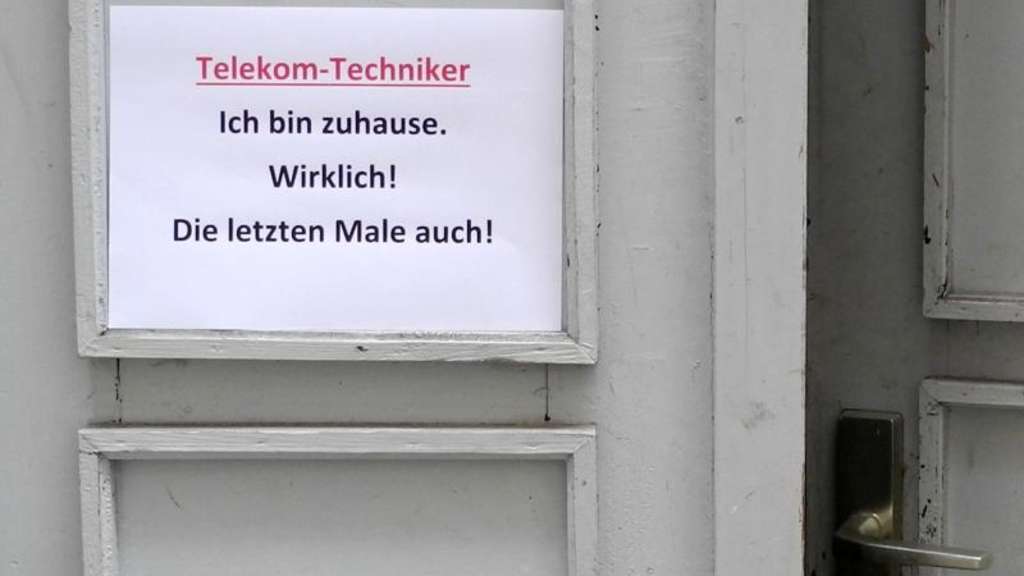 Naughty reads: “Telekom fitter, I'm at home. In fact! As in past times! ”
Naughty reads: “Telekom fitter, I'm at home. In fact! As in past times! ”
The installer did not come to us twice, arguing that ... "I could not find the house." The third time I just went out early in the morning to walk into the courtyard - and caught our installer, who arrived and was sitting in the car (obviously intending to leave the hotel without even ringing the door). After that, he with disgruntled physiognomy still deigned to connect us (15 minutes of work). This situation, unfortunately, is typical of any more or less large city in Germany. True, this is the only negative impression about the German Internet - this VDSL line gives out its 100 Mbit and works without complaints.
Our tariff is 30 euros per month - this includes a 100 Mbps line, a city telephone with SIP and an external IP.
Entry visa is given by the German Embassy, as a rule, for a period of 3 to 6 months. During this time, you need to have time to find accommodation, register and submit documents for the Aufenthaltstitel - residence permit, the issuance of which is in charge of Ausländerbehörde - Aliens Office. A residence permit can be issued either as an insert in the passport (the old version), or as a separate plastic card (the new version, now almost everyone is doing just that). The insert resembles a visa and is done on site when submitting documents, and the card must be waited for about a month. It looks like this:
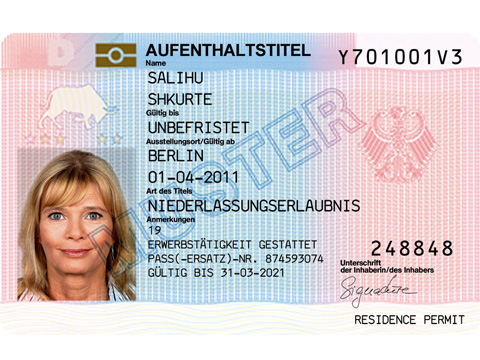
Here my sister and I made the third mistake: we postponed the solution of the issue with the residence permit until the time we find a permanent apartment. It seemed reasonable, because different Ausländerbehörde are responsible for Frankfurt and the region, and we would not be accepted in Frankfurt with regional registration. Therefore, we began to clarify this issue only in December, when we moved to a new apartment and registered in it.
As it turned out later, the regional Ausländerbehörde are small branches of paradise, where there are no queues and nice people work, and in Frankfurt this is a huge building with wild queues and hundreds of terribly busy employees who do not answer the phone and do not read e-mail. Having a hard time getting an answer from them, I found out that the nearest Termin to file documents was in May, even though my visa expired in March. To the sister, who had already managed to fly to St. Petersburg and return with the “correct” visa, the department did not deign to answer.
As a result, we had to spend an exciting night in front of the doors of Ausländerbehörde - because those who came without Termin received only 10 people a day, the office opened at 7:30 in the morning, and for getting to the top ten lucky ones, it was necessary to take hours for 4-5. We managed to pass the second time. I had no problems accepting all the documents on Blaue Karte, but my sister with her study visa was wrapped up - as it turned out, they sent a letter with a list of required documents by mail, only now it was lost somewhere, and without this list, naturally, documents are sister brought not everything. Moreover, in words, the staff of the department then painted one procedure, and later began to demand something completely different.
This was the fourth mistake: you must always find out in advance and in detail what documents are required. In addition, when interacting with Ausländerbehörde, it is necessary to record the name of the employee and require written confirmation of his words.
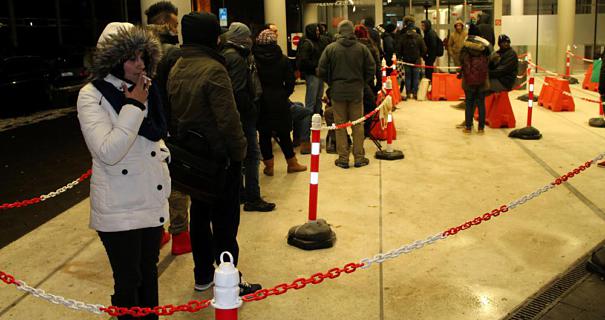 The queue in front of the doors of the Frankfurt Ausländerbehörde at 3 am.
The queue in front of the doors of the Frankfurt Ausländerbehörde at 3 am.
I received my Aufenthaltstitel in about a month, but my sister's story dragged on from January to September: the employee’s department employee responsible for her disliked something, found fault with each comma in the documents, demanded a bunch of mutually exclusive pieces of paper, and eventually refused in issuing a residence permit and threatened deportation. I had to hire a lawyer, whose services cost 500 euros - only after his intervention, the problem was finally solved, and my sister received the coveted residence permit. Picky employee Ausländerbehörde, by the way, after the complaint of a lawyer shoved out of retirement.
We came here on my old Hyundai Accent. Clearing it here would be realistic: there are benefits for immigrants, but now to register, alas. Cars assembled in Russia here require an expensive examination of CO2 emissions, the cost of which exceeded the cost of the car itself. Therefore, before buying a new car, I rode on Russian rooms.
Here there is one nuance that is usually little known to immigrants: you can bring a car with a foreign registration to Germany for a period of six months, but only if you come temporarily - for example, this is a business trip or work on a fixed-term contract. As soon as you get a long-term residence permit, you are obliged to clear the car and put it on record, otherwise it becomes illegal to use it.The police sometimes stop cars with foreign numbers on the autobahn for checking documents, and if you present a long-term residence permit, you will receive a fine, forced customs clearance and, optionally, a tax evasion charge. You can also get a check on the patrol Zoll (customs), which is also often interested in foreign cars. If you get into an accident - the Green Card insurance may well refuse to cover the damage because the car was in the country illegally. Therefore, think three times before using a foreign car here after receiving a residence permit - sooner or later it will become clear and you will have to pay a lot.
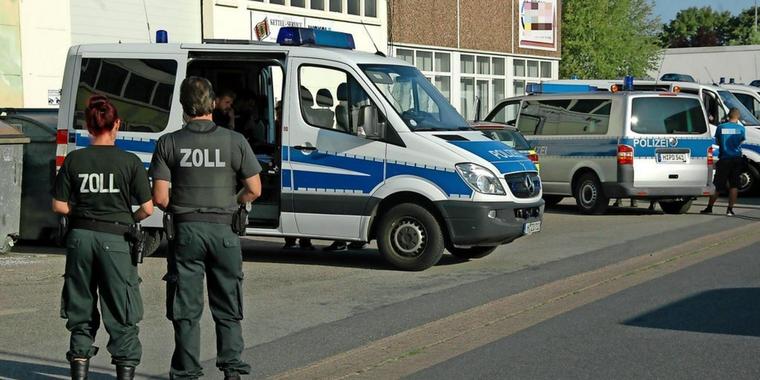
And here again is the morning, September 22. This post I write from our German apartment under the encouraging cries of the cat. Exactly one year has passed since the day we left Russia. Of course, this is not enough to become “ours” in the new country, but we have already settled down completely here, stepped on all the rakes typical of emigrants, resolved top-priority bureaucratic and not so much questions, and got used to the German way of life.
In the next, final, part of my story, I will describe the German everyday life, the differences in mentality and the ratio of expenses and incomes, talk a little more about car topics and tell you how it all happened: I have a job, and my sister has a study.
Kitten, who got a German passport for this year (veterinary, but how it sounds!), Wishes all the emigrants good luck :)
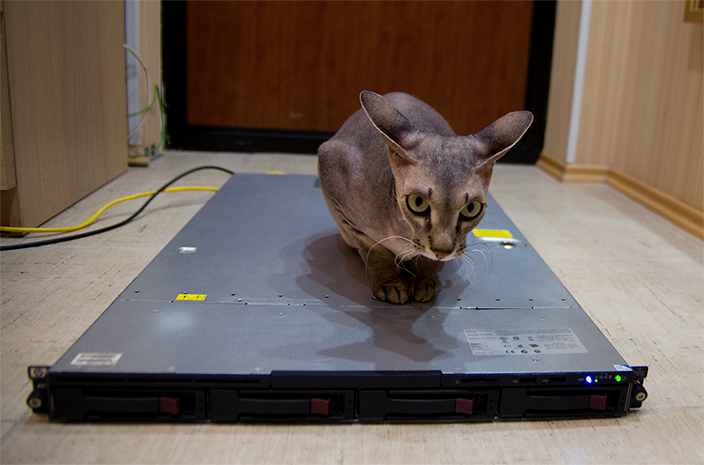
Sites where we were looking for an apartment:
www.immobilienscout24.de
www.wg-gesucht.de
Sites with information useful for new immigrants:
toytowngermany.com is an English-language website with active discussions on many topics that are important for a novice immigrant or someone who only going to move to Germany. The people there are mostly adequate and speaks the case,
info4alien.de is a German-speaking forum for foreigners in Germany. The people are more than adequate, there are employees of the German departments and embassies of Germany, who can give very good advice,
tupa-germania.ru is a Russian-language website containing many articles about the immigrant's everyday issues and their solution,
de-online.ru - a Russian-language site containing good materials for learning German and a forum that mostly deals with student and graduate topics.
I finally found the time and wrote the second part of my story about IT emigration. The first part can be read here - History of moving the system administrator to Germany. Part one: job search and visa . In this part, I will describe in detail how my sister and I settled in a new place, what mistakes we made and how much these mistakes cost us.
So let's go.
')
We had two international passports, a national visa, a work contract, a study contract and a whole host of things of all sorts and colors, as well as a bald cat, a long list of tasks, a car and a few thousand euros that would fall apart. It is not that all this was necessary for moving to Germany, but if you started to emigrate from Russia, it becomes difficult to stop. The only thing that worried me was housing. Nothing in the world is more helpless, irresponsible and vicious than finding an apartment in Frankfurt. I knew that sooner or later we would face this.

Preparing for the move
When I finally got a visa and it became clear that we were really going, my sister and I had only a month left. Prior to this, active actions were fraught with - a visa could not be given. In the end, we had to spin like squirrels in a wheel. We decided to go by car. I had to urgently do international veterinary documents for the cat, sort things out for “take it with you now” and “take it to my parents for now”, repair the car, go to the doctors, swear at the owners of our St. Petersburg apartment about the pledge ... on a bunch of institutions to collect documents for the German language visa. We both worked almost until the last day, because we desperately needed money — we had savings, of course, but how long it would take to move, we couldn’t even think about it. Here we were greatly helped by my hobby for amateur radio: by urgently selling off almost all the radio khams accumulated over the course of almost 9 years, we managed to gain a very good amount.
The question of housing arose before us almost immediately. Finding something in Germany remotely for a long time is unrealistic from the word “absolutely”. Especially in Frankfurt. Especially a month before arrival. And even more so with the cat. Through a site to search for tourist accommodation airbnb.com, my sister found an ideal option for these conditions - renting an apartment in the suburbs near the train station, 25 minutes by train from the city center. It cost some really terrible money, in the region of 1,300 euros per month, but we had nothing to choose from: everything else was either more expensive than two times like that, or it was located near the devil on the horns.
Having decided the main business, we laid a route through Latvia, Lithuania and Poland, calculated the road for 3 days, booked two apartments for overnight stays, quit and began to collect things.

On the last day we loaded the most necessary things into the car. Both had been on their feet for almost a day. Actually, we had a clearly planned relocation plan, and we didn’t anticipate anything: everything had to be shipped the day before, and on the last day we wanted to celebrate our departure in the pub ... But less than a week before the scheduled departure date I got seriously ill , and in the end all the plans flew to hell. And we naively planned to leave in the back seat a place for a cat where he could lie, sleep and eat, but there was so much “most necessary” things that the car was filled to the very roof (including two trunks), and we had a great skill "Shove nevpihuemoe." The cat eventually drove all the way at her sister's arms.

It was early morning, September 22, 2017. We last exited the entrance of the house where we lived for a year. In the parking lot, there was a car loaded at the most nowhere, in the carry we carried a cat, not yet suspecting what test it was waiting for. Our feelings were complicated: the past life was over, the new one had not yet begun, there were 2,200 kilometers ahead and three days to go.
Our road to Germany has begun.
Moving
The first day I will probably never forget. The route was seemingly simple: St. Petersburg - Kaunas. But first, we lost a lot of time at the consulate for an unsuccessful attempt to get a visa for our sister one day (which we were ready to read on the day before, but to put it on, the consulate demanded that they leave their passport for a day), and then they collected a lot of traffic jams and for three hours they stuck border because of the cat, which very slowly made out an aunt from the veterinary control. As a result, that day I, still not fully recovered and with a terrible lack of sleep, spent behind the wheel for about 15 hours, holding on to the antipyretic and energy. The cat also heroically kept, but at the twelfth hour he could not stand it and let it go, sitting on the lap of my sister ... I had to urgently search in the middle of the night for refueling in order to put my sister and car in order. Having reached the same night deep in Kaunas, we collapsed to sleep as if killed.

The second day was easier. Reaching the store for a local sim card (where we’re without internet), we headed for Polish Lodz. Three radio stations in the car talked about different voices, the cat sluggishly yelled, my sister and I looked around and still did not believe that we were not going on vacation. Having carefully patched near Warsaw because of the construction of the autobahn and having otvertovav threshold of the car about the cobblestone turned up inappropriately, we got to Lodz in the evening. The cat relaxed - it seemed that he thought that now he would no longer be taken anywhere ... A poor fellow.

On the third, final, day we covered about 900 kilometers - fortunately, already on the autobahn. The cat humbled and slept, hiding his head on his sister's lap. In the town of Neu-Isenburg (Neu-Isenburg), near Frankfurt, we were met by the owner of our temporary apartment, Adem. A Turk by nationality, he was fluent in German, had already lived in Germany for a long time and turned out to be a very hospitable person - he waited until late at night, he “staked out” a parking space for us and helped unload the car. Before falling asleep, I still managed to get Juniper SRX100 out of our luggage, connect an access point, a modem, and access the Network via LTE — there was no Internet connection in this apartment. Sister, too, of the last strength, posted in the social network that we arrived :)
Registration at the place of residence
The very first thing that you need to do not come to Germany as a tourist is to register at your place of residence. Without registration (Anmeldung) practically nothing can be done here - it is required for opening a bank account, for concluding many contracts for services and, most importantly, for obtaining a residence permit - Aufenthaltstitel. We have already learned about the fact that this Anmeldung is to be rented for a month through an airbnb housing, which is not accepted, we already learned upon arrival. The landlord at first refused us categorically, but then he nevertheless agreed to discuss this issue and granted us a visit with the whole family - apparently, for clarity. What is the joke, you ask?
Everything is quite simple. If you rent an apartment and are registered in it, you can only be evicted through court. Even if you do not pay for it and in every way violate public order. Naturally, no one of these apartment hemorrhoids is needed, but we managed to convince the owners of our trustworthiness and get their written consent for registration - on parole that we will not abuse trust. With this paper, we went to the town hall (Bürgeramt) and registered me, having received the coveted Meldbescheinigung - confirmation of registration at the place of residence. Why just me? As I already told, my sister did not have time to get a German language visa and arrived at the Schengen tourist, and tourists are not registered here.

Bank account and Termin
The next quest was a bank where you had to open an account - without it, living in Germany is impossible. The salary comes to this account, different payments are deducted from this account (telephone, Internet, etc.) ... Taking my sister as an interpreter, I went to the bank nearest to us - it turned out to be Sparkasse. And here we learned the magic German word Termin, which largely determines the life of the Germans :) Termin is a record in the institution, or to a doctor, or any appointment at all. Most of the actions in firms and institutions in Germany are done only with the preliminary appointment of Termin. The bank was not an exception - it was necessary to appoint Termin to open an account, and they had the nearest free time only in a week.

Having doubted the adequacy of the bank, I called my employer - they assured me that this was the norm in Germany and that no one would require a bank account from me on the first working day. So we appointed Termin, and after a week I opened an account in half an hour, to which, with a sigh of relief, we put our cash savings brought from Russia. Sister, again because of the "wrong" visa, the bank account is not supposed to.
Then I made the first mistake: I opened an account in the suburban branch of the bank, not making sure that I could serve it where I was going to live. Sparkasse is like the Russian Sberbank, a bunch of branches under one brand, but you can only serve the account where it was opened. As it turned out later, in Frankfurt there are no branches of the regional Sparkasse, as well as cash-in ATMs thereof. Well at least you can withdraw cash without a fee throughout Germany, yes.

Mobile communications and contracts
There are a lot of mobile operators in Germany, but all tariffs are more or less similar and are divided into two groups - prepaid and contract, and compared to Russia they are very expensive. The average package (unlimited calls and 5-7 GB of traffic per month) will cost 15-20 euros at a prepaid tariff. On a contract a little cheaper.
To temporarily solve the problem of home Internet, we bought a contractual tariff with conditionally unlimited traffic (10 GB LTE without speed limit, then the speed is cut to 1 Mbit) for 29 euros per month. We used this sim card for several months - until we moved to a permanent apartment and did not connect a landline Internet, after which the "unlimited" card was transferred to my sister, who always lacked 5 GB of her prepaid tariff. At the same time I was immediately given a phone with a corporate sim card.
Here there is one nuance that newbies often do not know: a contract is concluded for a fixed term (a year or two), and it is impossible to break it before. Just stop paying, too, can not - it will quickly reach the collectors and / or court, plus your credit history will be hopelessly flawed. Moreover, the contract is automatically renewed if you did not write a waiver of renewal 3 months before its expiration. The same applies in general to almost any service contracts - the Internet, a subscription to a fitness club, magazine subscriptions ... So I advise beginners to be very careful in these matters.
Medical insurance
It is impossible to live in Germany without insurance, and German insurance - our tourist were only fit for the first time. There are two types of insurance: public and private. If you don’t go into details, the difference is as follows: state insurance covers less risk (it almost doesn’t cover dentistry) and wait for a doctor’s visit for it longer, but it pays the doctors directly, the insured does not pay anything. In private insurance, there are more buns, but not everyone can buy it, and the payment mechanism in it is weird: first, you pay the bills from the doctors yourself, and then the insurance company reimburses your expenses.
I had the opportunity to choose between these two types of insurance and chose the state. Perhaps, then I will go to a private one, but so far I have no such need. The price of this insurance is not fixed, but is calculated as a percentage of the salary. My sister, as a disabled language student, could insure only in private insurance. Price tags there start from 300 euros per month and higher, but there are special rates for schoolchildren and students, which cost much less - from 30 to 80 euros per month. My sister compared the offers of various insurance companies in this segment for a long time, and eventually chose insurance for 60 euros per month, covering almost everything, including medicines. After about six months, she had to go to the doctor, the bill came according to Russian space standards - we paid for it and sent it to the insurance along with checks for medicines, and we were reimbursed absolutely all the expenses to the last cent.
Finding a permanent home
In Russia, we are used to the fact that renting an apartment is not a problem at all, there would be money. The supply exceeds the demand, you can easily choose a house to your own taste and wallet. If something does not like, you can always move out. Apartment owners, however, can also terminate the lease agreement and evict the tenant, yes. Absolute freedom. Moving is worth a penny. Pledge when renting housing rarely exceeds the monthly rent.
In Germany, everything is exactly the opposite. In large cities, those who want to rent any housing are 10 times more than offers. For good housing in a decent area with normal infrastructure, the demand is even higher. Rent is expensive, the average deposit is 3 monthly fees, so you need a lot of money at once. If you are foreigners, living here without a year a week, it will be difficult for you to find decent housing. If you are also not a husband-wife or a couple, and the option “one bedroom and a huge living room, it’s a kitchen” does not suit you, it will be even more difficult, since approximately 50% of the apartments are designed for couples. You have a car and you want a dedicated parking space / garage - I congratulate you, the difficulty of the search doubles. If you have a cat in addition, you can immediately hang yourself, and even if you don’t speak German very well ... Well, you understand, yes. The mission is almost impossible.
Then I made the second mistake: I did not succumb to my sister’s persuasion to immediately book that apartment with airbnb for two or three months. For some reason, I was sure that in a month we would definitely find something ... However, the reality turned out to be harsh.
Landlords rule the ball here. Housing is almost always taken off for years, many have been living in rented apartments for decades. A tenant in Germany is protected by numerous laws, and it is difficult, long and without a guarantee of success, to evict him, even if he drinks vodka, breaks ugliness and does not pay the rent. Nobody wants to get such problems on their heads, therefore landlords are very responsible for finding tenants.

Landlords are picky. Landlords are suspicious. They will look at your Russian passport with doubt. They will corrosively find out why your visa is valid for only half a year - and you will have to prove for a long time that you have arrived under the Blaue Karte program and will change your visa for a residence permit, but for this you need a damn apartment and registration. They will require a copy of your employment contract, passport and visa, employment certificate, salary certificate and that you do not have debts. They will gloomily ask how often your cat tears up walls and crawls in the corners, and pucker while listening to your answers in German or average English. And after all this, they will choose - and with a 90% chance they will not be chosen, because there surely will be a couple of normal German Germans among those who want to, with their native German language, German passports and without animals. In general, as time went on, the apartment was not located, and my sister and I began to nervously joke about how we would move with the cat and things to live under the bridge.
In the end, my sister made a miracle and after nearly a month of calls, sending letters and traveling to views she found us in the city very good and relatively inexpensive three-room apartment, in a green area and two steps from the metro. A cat has a certain merit here - having learned that he is bald, the broker on the other end of the line strictly asked if the cat would freeze in the winter. And at the meeting I was touched by the photos, so this time they did not refuse us.
By the way, until recently, if an apartment was rented out through a broker, then the tenant paid for his services - and this is plus one or two rents. But a couple of years ago, a law was passed according to which the broker is paid by the one who hired him (in this case, the landlord) - which somewhat alleviated the already difficult situation of those who are looking for housing in large cities.
In general, the apartment was found, but there was one bad luck - it was released only from December, and we had to move out of the rented housing through the airbnb at the end of October, it was impossible to extend it. It is still terrible for me to remember how much the astronomical sum cost us temporary housing for this period and how inconvenient it was.

Kaution
An important point was also a pledge for the apartment - Kaution. It amounts to three rentals excluding utilities (this is called Kaltmiete), and in our case it was required to pay more than 2000 euros. I did not want to part with such money, and I found a way out: you can enter into a special insurance called Bürgschaft. It costs about 100 euros per year and ensures that your landlord will be paid damages in the amount of up to those three rents if you break something in the apartment. Not all landlords agree to accept such insurance instead of the classic mortgage, but we were lucky.
Furniture
We already knew that long-term apartments here are rented, as a rule, without furniture. They often do not even have a kitchen - just bare walls plus a bathroom. Therefore, we laid in advance a certain amount to furnish an apartment. We were lucky with the kitchen - we bought it relatively cheaply from previous tenants along with all the appliances, but all the rest of the furniture had to be bought, delivered and assembled. It was cheaper and easiest to do this at IKEA - we chose furniture, and for a not very large amount (although it exceeded the cost of such services several times in Russia) we brought it and partially collected it (we ordered the assembly of only dimensional things like cabinets and beds). , everything else collected themselves). In total, for all the furniture, including the kitchen, we paid about 3,000 euros.
the Internet
The next problem was the Internet connection. Ethernet or optics in an apartment almost never occurs here, the most common connection methods are VDSL2 via a telephone line, or DOCSIS3 via cable TV. We did not have cable providers, only DSL remained, and with it we drank grief. The Internet was connected to us for two months . Because all the telephone lines here belong to the monopolist - Deutsche Telekom, and when connecting to any DSL provider, a visit of an installer (Techniker) from them is required. And the installer may simply not come at the appointed time, later lied that you were not at home. He will have nothing for it, his salary is fixed and does not depend on punctuality. Therefore, the monopolist installers frankly do not care about customers - no matter if you connect to Telekom directly or to their competitors.

The installer did not come to us twice, arguing that ... "I could not find the house." The third time I just went out early in the morning to walk into the courtyard - and caught our installer, who arrived and was sitting in the car (obviously intending to leave the hotel without even ringing the door). After that, he with disgruntled physiognomy still deigned to connect us (15 minutes of work). This situation, unfortunately, is typical of any more or less large city in Germany. True, this is the only negative impression about the German Internet - this VDSL line gives out its 100 Mbit and works without complaints.
Our tariff is 30 euros per month - this includes a 100 Mbps line, a city telephone with SIP and an external IP.
Residence
Entry visa is given by the German Embassy, as a rule, for a period of 3 to 6 months. During this time, you need to have time to find accommodation, register and submit documents for the Aufenthaltstitel - residence permit, the issuance of which is in charge of Ausländerbehörde - Aliens Office. A residence permit can be issued either as an insert in the passport (the old version), or as a separate plastic card (the new version, now almost everyone is doing just that). The insert resembles a visa and is done on site when submitting documents, and the card must be waited for about a month. It looks like this:

Here my sister and I made the third mistake: we postponed the solution of the issue with the residence permit until the time we find a permanent apartment. It seemed reasonable, because different Ausländerbehörde are responsible for Frankfurt and the region, and we would not be accepted in Frankfurt with regional registration. Therefore, we began to clarify this issue only in December, when we moved to a new apartment and registered in it.
As it turned out later, the regional Ausländerbehörde are small branches of paradise, where there are no queues and nice people work, and in Frankfurt this is a huge building with wild queues and hundreds of terribly busy employees who do not answer the phone and do not read e-mail. Having a hard time getting an answer from them, I found out that the nearest Termin to file documents was in May, even though my visa expired in March. To the sister, who had already managed to fly to St. Petersburg and return with the “correct” visa, the department did not deign to answer.
As a result, we had to spend an exciting night in front of the doors of Ausländerbehörde - because those who came without Termin received only 10 people a day, the office opened at 7:30 in the morning, and for getting to the top ten lucky ones, it was necessary to take hours for 4-5. We managed to pass the second time. I had no problems accepting all the documents on Blaue Karte, but my sister with her study visa was wrapped up - as it turned out, they sent a letter with a list of required documents by mail, only now it was lost somewhere, and without this list, naturally, documents are sister brought not everything. Moreover, in words, the staff of the department then painted one procedure, and later began to demand something completely different.
This was the fourth mistake: you must always find out in advance and in detail what documents are required. In addition, when interacting with Ausländerbehörde, it is necessary to record the name of the employee and require written confirmation of his words.

Little about the migration bureaucracy
I received my Aufenthaltstitel in about a month, but my sister's story dragged on from January to September: the employee’s department employee responsible for her disliked something, found fault with each comma in the documents, demanded a bunch of mutually exclusive pieces of paper, and eventually refused in issuing a residence permit and threatened deportation. I had to hire a lawyer, whose services cost 500 euros - only after his intervention, the problem was finally solved, and my sister received the coveted residence permit. Picky employee Ausländerbehörde, by the way, after the complaint of a lawyer shoved out of retirement.
Machine in Germany and customs
We came here on my old Hyundai Accent. Clearing it here would be realistic: there are benefits for immigrants, but now to register, alas. Cars assembled in Russia here require an expensive examination of CO2 emissions, the cost of which exceeded the cost of the car itself. Therefore, before buying a new car, I rode on Russian rooms.
Here there is one nuance that is usually little known to immigrants: you can bring a car with a foreign registration to Germany for a period of six months, but only if you come temporarily - for example, this is a business trip or work on a fixed-term contract. As soon as you get a long-term residence permit, you are obliged to clear the car and put it on record, otherwise it becomes illegal to use it.The police sometimes stop cars with foreign numbers on the autobahn for checking documents, and if you present a long-term residence permit, you will receive a fine, forced customs clearance and, optionally, a tax evasion charge. You can also get a check on the patrol Zoll (customs), which is also often interested in foreign cars. If you get into an accident - the Green Card insurance may well refuse to cover the damage because the car was in the country illegally. Therefore, think three times before using a foreign car here after receiving a residence permit - sooner or later it will become clear and you will have to pay a lot.

What's next?
And here again is the morning, September 22. This post I write from our German apartment under the encouraging cries of the cat. Exactly one year has passed since the day we left Russia. Of course, this is not enough to become “ours” in the new country, but we have already settled down completely here, stepped on all the rakes typical of emigrants, resolved top-priority bureaucratic and not so much questions, and got used to the German way of life.
In the next, final, part of my story, I will describe the German everyday life, the differences in mentality and the ratio of expenses and incomes, talk a little more about car topics and tell you how it all happened: I have a job, and my sister has a study.
Kitten, who got a German passport for this year (veterinary, but how it sounds!), Wishes all the emigrants good luck :)

useful links
Sites where we were looking for an apartment:
www.immobilienscout24.de
www.wg-gesucht.de
Sites with information useful for new immigrants:
toytowngermany.com is an English-language website with active discussions on many topics that are important for a novice immigrant or someone who only going to move to Germany. The people there are mostly adequate and speaks the case,
info4alien.de is a German-speaking forum for foreigners in Germany. The people are more than adequate, there are employees of the German departments and embassies of Germany, who can give very good advice,
tupa-germania.ru is a Russian-language website containing many articles about the immigrant's everyday issues and their solution,
de-online.ru - a Russian-language site containing good materials for learning German and a forum that mostly deals with student and graduate topics.
Source: https://habr.com/ru/post/354640/
All Articles